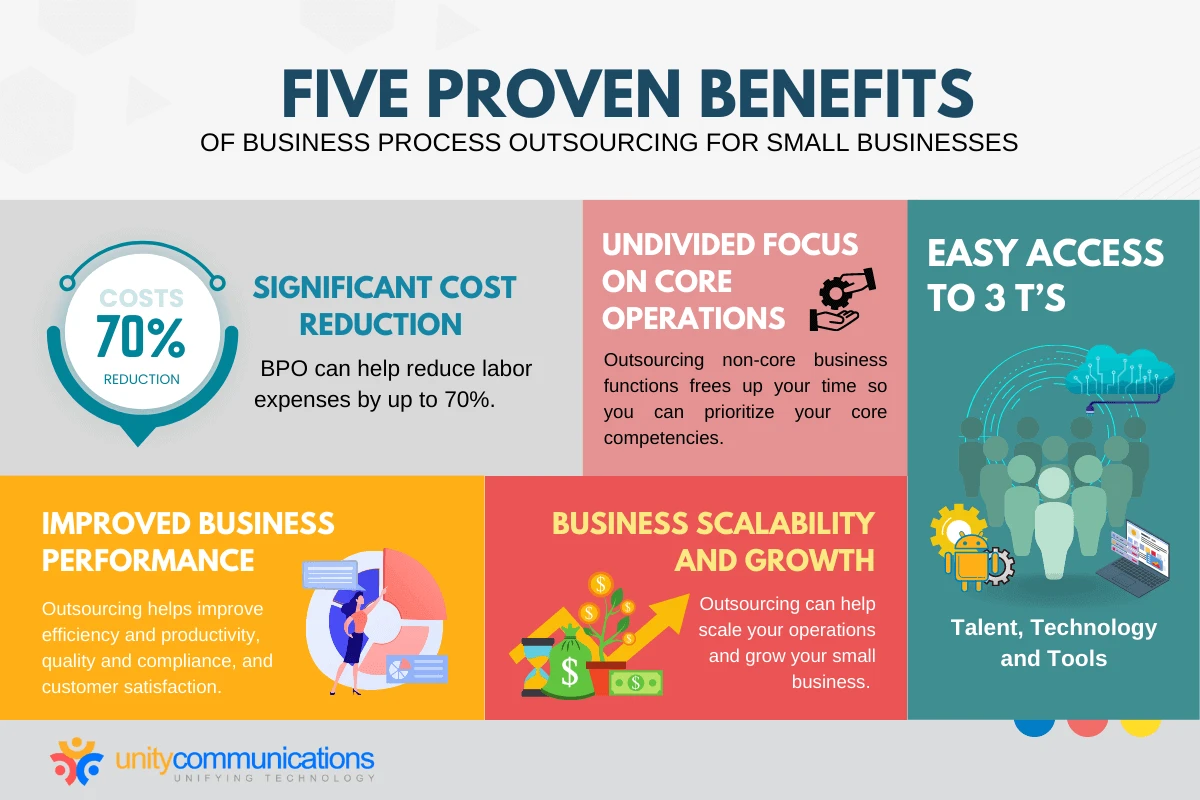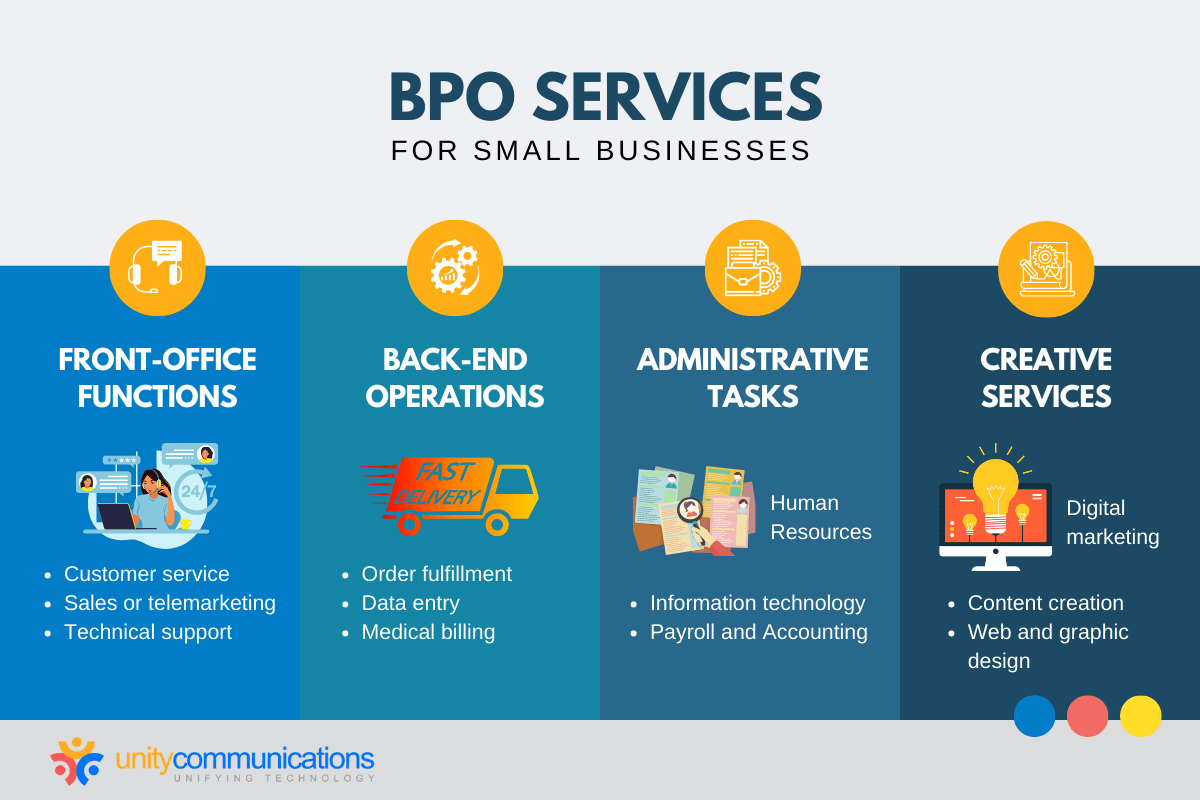IN THIS ARTICLE
Table of Contents
Small businesses usually have limited resources that hinder their expansion. Digital tools and technological resources enable them to access affordable and reliable services to scale their operations. That is where business process outsourcing (BPO) comes into play.
But how can BPO help your startup scale and grow? Continue reading to learn about the advantages of BPO for small businesses, supported by real-world examples.
5 BPO Benefits for Small Businesses with Real-world Examples

To begin, what is BPO? This business strategy involves delegating non-core functions or tasks to third-party service providers.
BPO has exploded in popularity among small businesses. Gone are the days when only big companies and large corporations employed outsourcing. Today, even small and mid-size enterprises (SMEs) harness the power of BPO services, and BPO trends and predictions show that the industry will keep growing.
According to Clutch, nine out of ten small businesses plan to outsource in 2022. They aimed to achieve the following objectives:
- Access flexible resources (33% of small businesses)
- Save time and improve (27%)
- Work with experts (26%)
- Grow their business (19%)
Let us delve into the five proven benefits of BPO for small businesses below.
- Significant cost reduction. Outsourcing allows you to cut operating expenditures, especially if your small business seeks to maintain its cash flow. Outsource Accelerator noted that BPO can help reduce labor expenses by up to 70%.
- Undivided focus on core operations. Outsourcing non-core business functions frees up your time and resources so that you can prioritize your core competencies—generating more money and growing your small business.
- Easy access to 3 T’s. Outsourcing gives you access to talent, technology, and tools. Skilled professionals, experts, and digital tools and technologies can help optimize your operations and grow your small business.
- Improved business performance. A reputable BPO provider can help improve your small business in the following aspects: efficiency and productivity, quality and compliance, and customer satisfaction.
- Business scalability and growth. Outsourcing can help scale your operations and grow your small business. It gives you access to expertise, technology, and resources, helping improve your efficiency, quality, and customer satisfaction. Ultimately, outsourcing translates to business profitability and growth.
Still unconvinced? Learn from the real-world examples of BPO adoption for small businesses below.
Unity Case Study #1. E-commerce Business for Arts and Crafts
An e-commerce business specializing in arts and crafts contacted Unity Communications to handle its administrative, marketing, and customer service functions. The tasks included invoice reconciliation, social media marketing, and online store management, as well as the following:
- Customer support
- Product shipping
- Delivery tracking
- Returns and refund management
Unity Communications built a robust front- and back-office team with a reliable manager. Specifically, we helped streamline the e-commerce store’s management and simplify its invoicing processes.
We also integrated a customer relationship management (CRM) solution with Facebook to boost the client’s social media marketing efforts.
After two weeks, Unity Communications optimized our client’s e-commerce processes and improved its marketing campaign. We also helped establish its online presence on e-commerce websites such as Shopify, Amazon, and Etsy.
| The benefit of BPO for the small business: Outsourcing gave the client more time and energy to focus on producing more arts and crafts products, generating more income, and growing the business. |
Unity Case Study #2. Private Equity Company for E-commerce
A private equity business specializing in e-commerce brands sought help from Unity Communications. Due to the pandemic, this client faced many customer requests through online purchases and e-commerce transactions. For this reason, it outsourced its customer support to meet the increasing customer demand.
Unity Communications established a customer service and sales team to handle inbound calls. We also set up key performance indicators (KPIs), such as average hold time (AHT), customer satisfaction (CSAT), and first call resolution (FCR), to monitor, measure, and improve performance. Lastly, we helped the client create a call flow structure with whiteboarding sessions provided by the Call Flow Solution team.
After 90 days of operation, Unity Communications successfully met the KPIs. The client earned a satisfaction rate of 95% in just two months. The BPO team also exceeded its daily sales quota (18 sales per day).
| The benefit of BPO for the small business: Outsourcing helped the client improve customer service operations and increase sales for business growth and success. |
Types of BPO Services Available for Small Businesses

According to a recent Clutch report, 83% of small businesses will either maintain or increase their expenditures on BPO services this year. About 62% of them are worried about a potential recession. But they still plan to outsource to:
- Grow revenue,
- Build teams, and
- Acquire new customers.
Further, small businesses look for BPO service providers for the following services:
- Marketing (27%)
- IT services (22%)
- Design (21%)
But what other outsourcing services can small businesses employ? Below are some:
Front-office Functions
These tasks involve direct interaction with customers. Startups and SMEs can outsource the following front-office functions:
- Customer service – assisting customers via phones, email, live chat, and social media channels
- Sales or telemarketing – selling products and services via outbound calls or cold email outreach
- Technical support – providing technical assistance to end users of technologies such as computers, mobile phones, and electronic devices
Back-end Operations
These back-office tasks focus on internal business processes and operations. Small businesses can outsource the following back-end functions:
- Data entry – recording, organizing, and securing business data, product information, and customer details
- Order fulfillment – beginning with processing orders and ending with delivering products to customers
- Medical billing – coding medical services and generating superbills for patients or insurers
Administrative Tasks
These back-office functions are critical but not necessarily core to the business. BPO for small businesses includes the following administrative work:
- Payroll and accounting – including bookkeeping, tax filing, and employee benefits management
- Human resources (HR) – covering recruitment, onboarding, training, and employee performance management
- Information technology (IT) support – including software and hardware troubleshooting, system maintenance, and network management
Creative Services
Creative outsourcing services focus on design, marketing, and content creation. Startups and SMEs can outsource the following creative work:
- Digital marketing – including search engine optimization (SEO), pay-per-click (PPC) advertising, email marketing, and social media management
- Content creation – covering copywriting, blogging, guest blogging, and video production
- Web and graphic design – including web creation, responsive web design, UX design, logo creation, and brochure design
5 S’s: How To Choose the Right BPO Provider for Your Small Business

Engaging in BPO services can yield numerous benefits for small businesses, but it also brings inherent risks and potential challenges. To effectively address these aspects, it’s crucial to collaborate with a dependable BPO provider. Follow these pivotal steps below to guide you in the selection process:
- Study your small business operation. Begin by conducting a comprehensive analysis of your small business operations. This diligent examination allows you to delve deep into your business issues and requirements. Through this step, you can pinpoint which processes are prime candidates for outsourcing and identify the essential qualities you seek in a BPO provider.
- Set your outsourcing requirements. Building upon your understanding of business operations, articulate your specific outsourcing needs. Clearly outline the services required, the desired level of expertise, and other critical factors, including technological capabilities, workforce proficiency, facility considerations, cost parameters, and preferred location.
- Search for BPO service providers. Now, embark on the quest to identify potential BPO firms. Commence your search online to compile a list of prospective partners capable of delivering services aligned with your requirements. Additionally, you can tap into referrals or recommendations from businesses with outsourcing experience.
- Screen prospects based on critical factors. Evaluate the potential BPO providers by scrutinizing their websites, reviewing client feedback, and conducting interviews. Pay close attention to essential factors such as their track record in BPO services, accumulated experience and expertise, workforce and technological capabilities, pricing models and associated costs, and the transparency of their BPO billing practices.
- Select the best fit for your business. After a thorough assessment, you can proceed to engage an outsourcing partner. Notably, 78% of businesses emphasize cultivating positive relationships with their BPO partners. To achieve this, opt for a service provider that aligns seamlessly with your business type, size, requirements, budget constraints, and niche specialization.
The Bottom Line
BPO for small businesses has long proven highly beneficial and effective. Take it from the real-world success stories discussed above. They demonstrate how outsourcing can help startups and SMEs grow and succeed.
Outsourcing can reduce operating costs and help you focus on core operations. It can also give you access to talent, technology, and tools and improve your service efficiency, quality, and customer satisfaction. BPO can help achieve scalability and growth for your small business.
Looking for the right BPO partner? Drop us a line, and let’s connect! As a BPO company, Unity Communications is fully committed to helping startups and small businesses scale. Contact us today!





